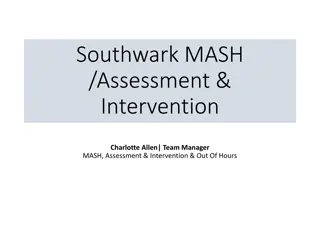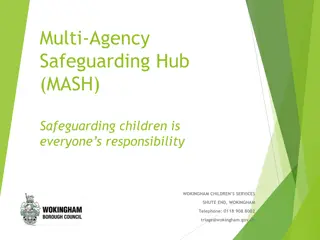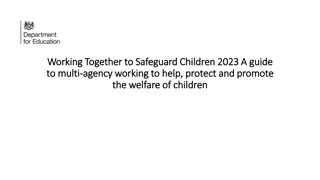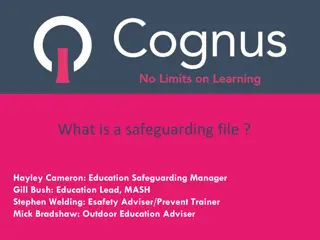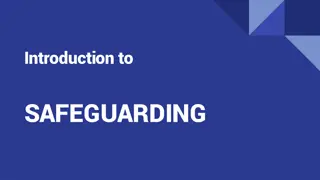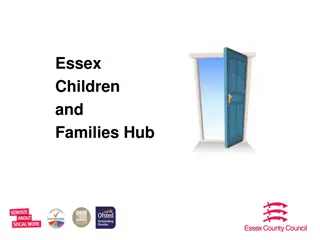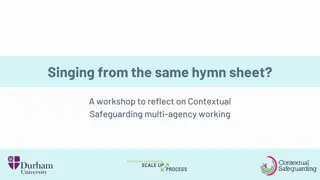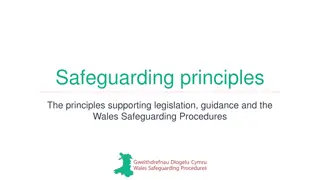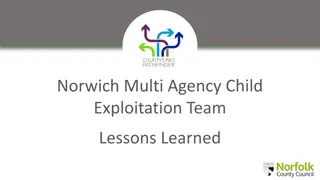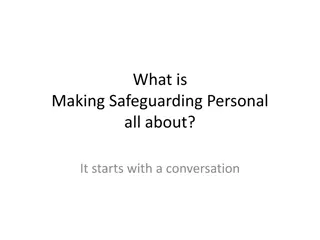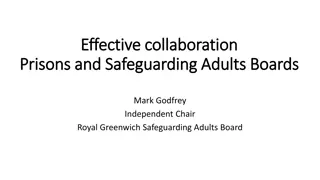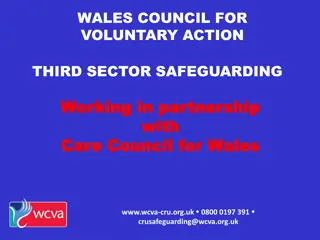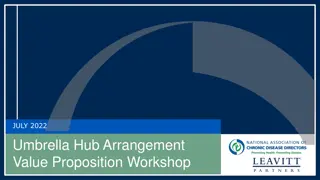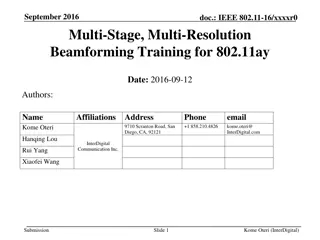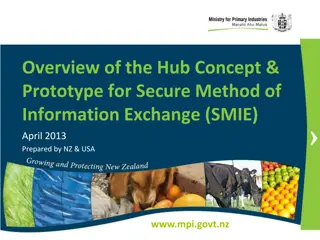Understanding the Multi-Agency Safeguarding Hub (MASH) in Southwark
The Multi-Agency Safeguarding Hub (MASH) in Southwark plays a crucial role in safeguarding children by providing timely and effective interventions. Established in response to the Victoria Climbié Inquiry and the Children Act 2004, MASH aims to promote collaboration among various agencies to assess risk, identify needs, and deliver appropriate support swiftly. The hub comprises professionals from different fields like social care, police, mental health, domestic abuse services, and more, working together to ensure the safety and well-being of vulnerable children and families.
Download Presentation

Please find below an Image/Link to download the presentation.
The content on the website is provided AS IS for your information and personal use only. It may not be sold, licensed, or shared on other websites without obtaining consent from the author. Download presentation by click this link. If you encounter any issues during the download, it is possible that the publisher has removed the file from their server.
E N D
Presentation Transcript
MASH /Safeguarding Fardowsa Ga al | Service Manager & Mariam Alli| Team Manager MASH, Assessment & Intervention & Out Of Hours
Ofsted Report findings 2022 Ofsted Report findings 2022 Overall grading Good. Early help provision in Southwark is strong. Leaders maintain a focus on delivering effective early help services. Children and their families benefit from impactful preventative work. Children s needs are identified through good-quality assessments, leading to effective plans which are linked to presenting issues and deliver the help they need promptly. This improves their lives. The multi-agency safeguarding hub (MASH) provides a timely and proportionate service for children and their families. Management oversight is a strength and is effective. Managers are a strong and supportive presence, readily available for social workers to discuss concerns. Effective management decisions in response to presenting risks lead to appropriate next steps.
Why was MASH established Why was MASH established The Victoria Climbi Inquiry, 2003- Emphasised the need for better communication, better information sharing, joint working. The Children Act 2004- importance of safeguarding children, working together to promote the wellbeing of the child. (sections 10 and 11 places obligations on partner agencies Serious Case Reviews for example: Daniel Pelka- 2013 https://www.lgiu.org.uk/wp-content/uploads/2013/10/Daniel-Pelka- Serious-Case-Review-Coventry-LSCB.pdf
What difference should MASH What difference should MASH make make Accurate assessment of risk and need, as safeguarding decisions are based on collaborative work between agencies. It should offer a proportionate and timely response to concerns that have come through to Children s Services. (aim to complete in 24hrs) Least intrusive approach. Earlier interventions and helps to decide what level of service provision is needed.
MASH Principles The MASH aims to promote the safety and welfare of children by providing better access to the information that will help to identify safeguarding risk, underpin a clearer understanding of need and lead in turn to effective and proportionate interventions and support. The MASH way of working ensures that children and young people have a better chance of receiving the service that is suitable for them, and we spot any potential problems earlier. The focus of the MASH is to work across partner agencies ensuring families receive early help in order to reduce the need for statutory intervention.
Who is in the MASH? Southwark Children s Social Care Family Early Help Police Public Protection Unit (MASH Police) Community Health SLAM (Adult Mental Health) Solace Women s Aid (Domestic Abuse) Youth Justice Service Probation Southwark Housing Department CGL (Change Grow Live ) Hidden Harm/substance abuse Worker
Consent and Information Sharing It s important that you talk to parents or carers who hold parental responsibility about your concerns and obtain consent before making a referral. MASH will often contact health professionals, education settings and other relevant professionals for further information before making a decision on whether an assessment should be undertaken or not. You must discuss this with the family prior to making the referral and indicate whether they consent to this or not. A referral can be made without consent if: you have made all possible efforts to inform the parents, carers or young person over the age of 16 of the referral without success You have informed the parents, carers or young person about the referral, but they don t consent and you feel the child is at risk of significant harm Professionals should indicate the reason why consent has not been obtained in the referral and consider whether child protection threshold to override parental consent is met or contact MASH on 0207 525 1921 for consultation and advice. Why is consent important? Families have a right to know what information is shared about them between professional organisations. Consent is important in building trust and better working relationships between professionals and parents Quote from Crime Prevention Minister Norman Baker 2013 if it s a choice between data protection and child protection, child protection must come first. Quote from Oftsed 2022 report Parental consent is overridden appropriately when required, enabling social workers to act at a pace consistent with the level of risk.
The 4 Levels of need The 4 Levels of need Tier 1: No additional needs These are children with no additional needs; all their health and developmental needs will be met by universal services. These are children who consistently receive child focused care giving from their parents or carers. The majority of children living in each local authority area require support from universal services alone. Tier 2: Early help These are children with additional needs, who may be vulnerable and showing early signs of abuse and/or neglect; their needs are not clear, not known or not being met. These children may be subject to adult focused care giving. This is the threshold for a multi-agency early help assessment to begin. These are children who require a lead professional for a co-ordinated approach to the provision of additional services such as family support services, parenting programmes and children s centres. These will be provided within universal or targeted services provision and do not include services from children s social care. Tier 3: Children with complex multiple needs These children require specialist services in order to achieve or maintain a satisfactory level of health or development or to prevent significant impairment of their health and development and/or who are disabled. They may require longer term intervention from specialist services. In some cases these children s needs may be secondary to the adults needs. This is the threshold for an assessment led by children s social care under Section 17, Children Act 1989 although the assessments and services required may come from a range of provision outside of children s social care. Tier 4: Children in acute need These children are suffering or are likely to suffer significant harm. This is the threshold for child protection. These children are likely to have already experienced adverse effects and to be suffering from poor outcomes. Their needs may not be considered by their parents. This tier also includes Tier 4 health services which are very specialised services in residential, day patient or outpatient settings for children and adolescents with severe and /or complex health problems. This is likely to mean that they may be referred to children s social care under section 20, 47 or 31 of the Children Act 1989. This would also include those children remanded into custody and statutory youth
MASH consultations What to do before you ring the Consultation line? You should follow your organisations safeguarding processes before calling the consultation line. All statutory organisations should provide a way for staff to seek help and advice on individual cases. All organisations are required to have named/designated safeguarding professionals and you should make sure yourself familiar with their contact details. Take advice through your line manager or the person who offers you safeguarding supervision. How does the consultation line work? The person offering advice on the consultation line will be a Social Worker within Southwark MASH. During consultation, you should: Be clear about your concern and what is needed from the consultation. Clearly identify what your organisation has already done about the concern and the impact of this. Seek clarification where there are any uncertainties about what is involved. The MASH will record detail of the discussions and recommendations made but will not record the child's name. All professionals seeking a consultation must identify themselves and they will be sent an email summarising the discussion and advice given. Southwark MASH will take no further action after this until if following consultation more information comes to light or the situation changes, you can seek further clarity by calling the consultation line again. If you feel that the response you have received following a consultation is inadequate, does not meet the needs of the child/family or leaves a child at risk of harm you can still make a referral in the usual way or escalate your concerns through your organisations safeguarding process.
BREAK BREAK
Case Study Case Study Please review the case study and the Southwark Threshold document. Consider what you may want to explore with the children and parent. Consider what the immediate safety plan would look like. At which point would you refer to MASH and why. Learning/reflection to be shared


